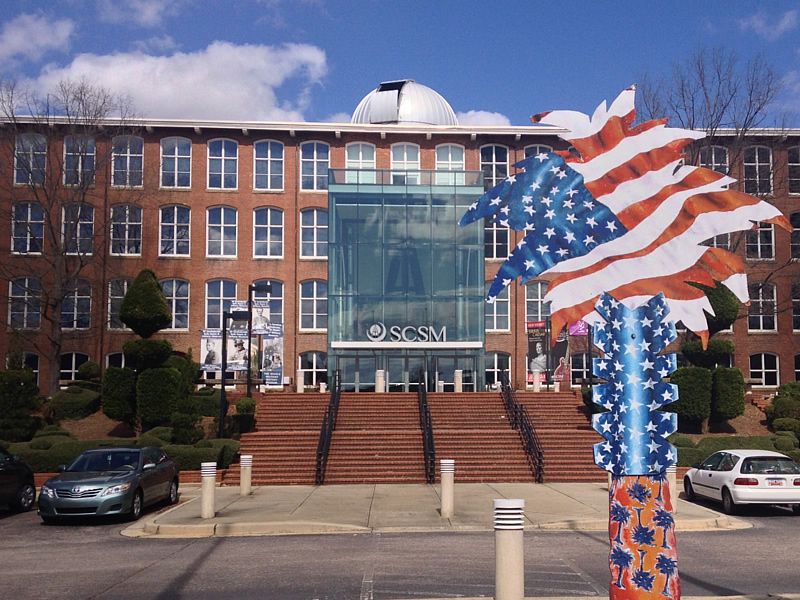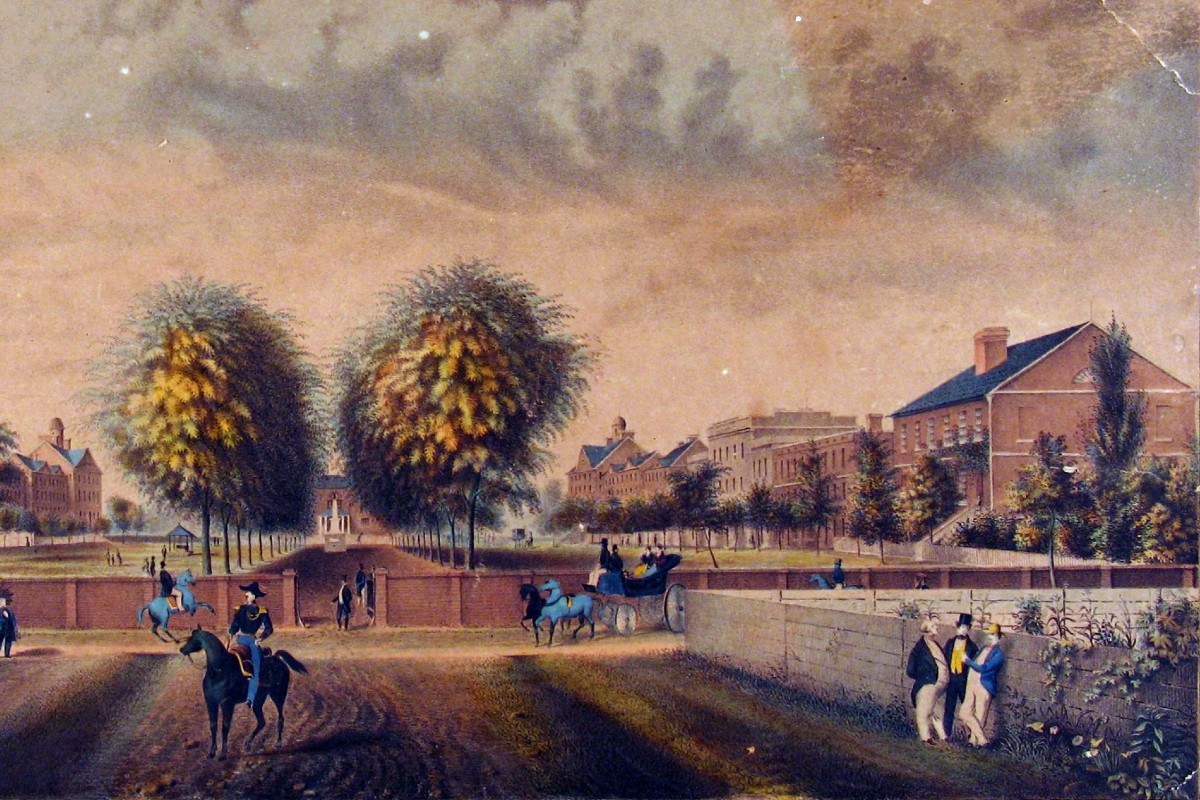STATEHOUSE REPORT | ISSUE 20.50 | DEC. 10, 2021
BIG STORY: Is the Lincoln Project the vanguard of American democracy
NEWS BRIEFS: Alexander, Peeler now lead state Senate
LOWCOUNTRY, Ariail: Omicron
COMMENTARY, Brack: Haley’s new book is craven plea for political relevance
SPOTLIGHT: S.C. Senate Democratic Caucus
MY TURN, Knapp: Businesses support America’s democracy
FEEDBACK: Send us your thoughts
MYSTERY PHOTO: Old painting
GREAT GIFT: Looking for a great holiday gift? What about the fun history, 350 Facts About Charleston? Only $20 in print – and now $9.99 as an ebook.
Is the Lincoln Project the vanguard of U.S. democracy?

By Andy Brack | America is in the throes of the largest internal political war since its first, the American Civil War, began in Charleston 160 years ago. Then, as now, the nation was being pulled apart by injustice, inequity and white supremacy. Now, however, the battlefield is far different. The weapons aren’t rifles, cannon or a submarine. Rather, warriors often employ sophisticated technology, messaging, misinformation, disinformation, gerrymandering and fear to manipulate a sleeping electorate to question long-held values of decency, the common good, fairness and the American dream.
Is anybody really standing up and fighting these days for democracy? Meet the Lincoln Project.
Do something
“The only thing necessary for the triumph of evil is for good men to do nothing.”
—Quote often attributed to Irish philosopher Edmund Burke, although many sources question the attribution
The lies. The scandals. The narcissism. The continual conflict about anything from the size of a crowd to what to do about a pandemic. It was all just too much for a few veteran Republican campaign strategists who witnessed their fiscally conservative, beloved party spin out of control to a pied piper who didn’t take democracy seriously. They had to do something. So they fought back with the tools they had — political messaging to get inside the head of President Donald Trump so voters would see him rage out of control.

“Our belief is you have to fight this in the culture,” said Stuart Stevens, a key player for the Lincoln Project and top strategist for Mitt Romney’s 2012 GOP presidential campaign.
The Lincoln Project spent tens of millions of dollars in 2020 on pithy short videos and persuasive campaign ads in targeted battleground states. It was a campaign against one person to keep him from remaining in the White House.
“I quickly realized how liberating it was to not have a client,” Stevens recalled in an August interview. “We were in this kind of unique position of having freedom. We don’t have any clients. We don’t have any special interests.”
In Pennsylvania, they completed 8.3 million often snarky digital ad messages with targets as seniors and suburban women. In Arizona, 8.1 million messages targeted seniors and college-educated whites. Biden barely won both states. But the intricate list goes on, targeted and microtargeted, to move disaffected GOP voters away from Trump.
“Of all of the work we did in 2020, we never had one ad about an issue,” said Stevens. “It was all about Trump. If you remember back in 2019, there was an opinion by a lot of Democrats that the way to successfully prosecute the campaign against Trump was to not talk about Trump. We took a very different approach. We thought the first 10 issues in the race were Trump.”
The Lincoln Project rewrote the political playbook by going on the guerilla attack instead of what they’d done traditionally for years — research an issue, strip it down to a core message, cut a campaign ad, test it with focus groups, re-edit and finally run it — weeks or months after the idea. At the Lincoln Project, an ad might be an idea one day and online the next.

“We had more than 300 pieces of video content last year,” said Lincoln Project co-founder Rick Wilson. “We didn’t have time to sit in focus groups.” All totaled, they completed 60 million views of their television ads and delivered 242 million digital impressions, according to a 2020 stewardship report.
In the first few months of the Lincoln Project, the group raised about $5 million, a number that would grow 20-fold by the end of 2020.
“The idea that you had to do something was something that really motivated us all,” Wilson recalled. “We couldn’t sit on the sidelines as the Trump movement became increasingly obvious what it was. We couldn’t say we were OK with authoritarianism, with cruelty. We couldn’t be OK with that because we saw what the alternative was — a country that looked so different from an American republic.”
And today, pariahs in their old party, they’re still at it.
“Our business is democracy and American liberty and the preservation of a republic that is challenged every day by people who would destroy it in order to gain political power. We live in a very dangerous moment. We’ll work with anybody who wants to preserve democracy.”
‘Just win, baby’
“Men ought either to be indulged or utterly destroyed, for if you merely offend them they take vengeance, but if you injure them greatly they are unable to retaliate, so that the injury done to a man ought to be such that vengeance cannot be feared.”
—Niccolo Machiavelli, The Prince
About 100 years after former S.C. Confederates sabotaged Reconstruction in 1876, Palmetto State political consultant Lee Atwater started practicing a “win at all costs” politics. It eventually propelled Carroll Campbell into Congress and later as a Republican in the governor’s mansion who masterminded the GOP’s takeover of the S.C. House of Representatives. Atwater then led the 1988 presidential campaign of George H.W. Bush, fueled by acolytes like Wilson and Stevens.
“All of us were raised on this (kind of politics),” Wilson said. “It was the Lee Atwater line — ‘Just win, baby.’ That was Machiavelli with a Southern accent. You go out there and win. That’s something that informed our work.”
But after Trump seized control of the GOP in 2016 and his party congressional leaders fawned despite pettiness, scandal and lies, it became too much for Wilson, Stevens and Lincoln Project cofounders Reed Galen and Steve Schmidt, both key players in Sen. John McCain’s 2008 presidential campaign.
Since then, they’ve weathered their own scandals, notably resignations of Schmidt and others after reports of sexual misconduct by another co-founder and questionable campaign tactics in a 2021 Virginia race for governor. They’ve also been criticized for double-dealing by steering millions of dollars raised to media companies with which they are connected.
Wilson bristled at the suggestion he and his colleagues left comfortable consulting jobs with the GOP to get rich and famous. “I used to make a lot more money. I didn’t get death threats. My kids didn’t get death threats. All of us had very comfortable lives. We worked hard, but it was not a hard life.”

Meanwhile, John Podesta, chairman of the center-left Center for American Progress, said the creative work by the Lincoln Project “is terrific, but they didn’t put enough behind it.” By that, he meant it needed to get broader attention beyond digital impressions and targeted television ads. The messaging reached Democrats, who needed to feel good that somebody was punching at Trump, he said, but it wasn’t clear how much of a difference it made to mainstream GOP voters.

“But when it was as close as it was, you could plausibly say that everything mattered,” observed Chris Cooper, a Charleston native who has a digital Democratic consulting firm in Washington.
Another Democratic strategist, Pennsylvanian Eric Schnurer, said he believes the most important issue for the future of American politics is to bring the GOP back from “the insanity into which it is sinking further every day,” but it may be too late.

As for the Lincoln Project, Schnurer agreed it makes good ads that entertain Democrats.
“I don’t know if they’re effectively reaching the swing or loosely Republican-attached voters needed to win elections,” he said, adding that he worried about Democrats losing big ground in 2022, which would lead the GOP to retake control of Congress.
“They (Lincoln Project) don’t seem to be establishing a beachhead for other establishment Republicans to join them, or creating a movement for the new centrist-conservative party that might splinter the vote or even encouraging or shaming one Republican out of their willingness to play the role of a modern Richard Rich, selling their souls for bootlicking political sinecures.
“So yes, the Lincoln Project may indeed be the most important political organization in the country right now, which is largely a sign of how hopeless things have become.”
Preserving democracy
“He will win who knows when to fight and when not to fight. … If your opponent is of choleric temper, irritate him.”
—Sun Tzu, The Art of War

Joe Trippi, often remembered as the campaign manager for former Vermont Gov. Howard Dean in the 2008 Democratic primaries, joined the Lincoln Project earlier this year to defeat authoritarianism, plain and simple.
“I am a Democrat. The Lincoln Project was a group of former Republicans. I joined the Lincoln Project because all of us have to put past fights and differences aside and come together on the only thing that matters right now — saving our union, our republic and our democracy.”
He fought for Democrats against people like Wilson and Stevens. “Those differences no longer matter,” Trippi said. “The threat to our democracy is real and all of us as Americans have to put our differences aside to stop it.”
Wilson and Trippi said the Lincoln Project is going into 2022 strong and will hit back in early January to remind Americans of the threat that the Jan. 6 rioters made to the nation’s freedoms.
“No American who cares about preserving our democracy for future generations can afford to be exhausted now,” Trippi said. “Authoritarians like Trump count on their ability to exhaust their opponents. That is how they win. The Lincoln Project has hundreds of thousands of energized supporters. Far from being exhausted, we are waking up more and more Americans every day to what this fight is really about.”
Wilson said Lincoln Project leaders have been reengaging major donors in recent months who he said “are recognizing we have a fairly unique proposition in the American political space and we bring a perspective that few other groups can replicate. A large corps of voters are still in play.”

John L.S. Simpkins, who runs the North Carolina-based MDC think tank, says it’s important for groups like the Lincoln Project, as well as legal aid centers, media and community organizers, to push for a vibrant civil society to protect American democracy. He learned that lesson almost 30 years ago when he worked in South Africa as a new Harvard graduate as the country moved from apartheid to democracy.
“An anti-fascist, fiscally conservative alternative to the modern GOP would be one new church for the Lincoln Project to plant, but that is the work of generations, not election cycles,” said Simpkins.

Heidi Beirich, an expert on extremism who is a co-founder of the Global Project Against Hate and Extremism based in Montgomery, Alabama, said more pro-democracy work needed to be done, especially as conservative organizations are attacking voting infrastructure.
“Stacey Abrams and her organization [in Georgia], as well as other organizers for the Latino and Black communities, are doing important, on-the-ground work,” she said. “We need more public education on what is happening to our voting system and more investment in get-out-the-vote efforts. The media also needs to be more aggressively covering what is happening so that people will believe in our electoral system.”
Wilson vows the Lincoln Project will be active in 2022 and 2024, hustling, pushing, messaging, strategizing and trying to sway voters to protect democracy.
“There are a lot of groups saying they are in the fight to preserve democracy. They’re earnest and well-meaning, but the minute somebody swings a fist, they run. The minute somebody swings a fist at us, we get out a tire iron.”
- Have a comment? Send to: feedback@statehousereport.com.
Alexander, Peeler now lead state Senate
Staff reports | Oconee County Republican Sen. Thomas Alexander became the new president of the state Senate following the resignation this week of Sen. Harvey Peeler, R-Cherokee, who took the powerful position of chairman of the Senate Finance Committee.

While controlling the day-to-day business and debate of the state Senate is a key position, Peeler’s move to chair the budget-writing committee is actually a step up in power because of the way the position has its fingers in every part of funding state government. The position became open last month after the passing of longtime Finance Chair Hugh Leatherman of Florence.
After Peeler, now the Senate’s longest serving Republican, turned over the purple president’s robe to Alexander, he said, according to the Associated Press, “While serving as the first elected president of the body is and always will be one of the greatest honors of my life, my work on the Finance Committee will allow me to focus on the issues most important to our state.”

Alexander, 65, is seen as a consensus builder who works toward compromise. He was chosen unanimously, a mark of the respect he has among Democrats and Republicans. He was first elected to the S.C. House in the late 1980s as a Democrat and moved to the Senate in 1994.
In other recent news:
House removes private vaccine ban after business push. The S.C. House this week considered a bill pushed by conservatives that would have banned employers from requiring COVID-19 shots, but the business community pushed back, leading the GOP to rewrite the bill. The House on Thursday spent five hours debating the vaccine ban proposal, but at the last minute switched to remove a vaccine ban for private employers. The bill still needs Senate approval, which won’t come until next year.
![]() S.C. experts say state could have sun, few clouds in economic forecast. Amid concerns that new COVID-19 variants could derail the national economy again, South Carolina’s economy is booming and has recovered almost all of its losses from the pandemic, according to state experts at the University of South Carolina’s annual economic conference. More: The Post and Courier.
S.C. experts say state could have sun, few clouds in economic forecast. Amid concerns that new COVID-19 variants could derail the national economy again, South Carolina’s economy is booming and has recovered almost all of its losses from the pandemic, according to state experts at the University of South Carolina’s annual economic conference. More: The Post and Courier.
New House, Senate districts approved. South Carolina state senators approved new districts for the Senate and House Tuesday, but legal challenges are almost certain before filing begins in March for the 2022 elections. Work is still underway to finish maps for the U.S. House districts. Efforts were delayed after Democrats appeared ready to put up a fight over efforts to split Charleston between the 1st and 6th districts. More: Associated Press, The State, The Post and Courier.
No murder arrest. More than six months after the wife and son of a prominent Hampton County attorney were gunned down at their family’s estate, their killings remain unsolved and no arrests in the case have been made. Meanwhile, the legal drama around Alex Murdaugh has only grown. On Friday, state Judge Alison Renee Lee of Richland County will oversee a new virtual bond hearing for Murdaugh on the multiple indictments of financial misconduct. Murdaugh now faces more than 50 charges. More: AP News, WSAV, The HIlton Head Island Packet.
Episcopal church split in S.C. goes back to high court. The state Supreme Court ruled in 2017 that 29 Episcopal Church parishes that broke away from the church were to hand over their properties while seven breakaway churches could keep their properties. Now, arguments over the split have returned to the state’s highest court and may help clarify the 2017 decision. More: The Post and Courier.
Federal prosecutors still investigating Orangeburg Massacre. The U.S. Department of Justice still has cold cases from the civil rights era open. Included in those cases is Orangeburg Massacre, the 1968 event at S.C. State College in Orangeburg that led to three men dying after police officers fired on the crowd. More: Orangeburg Times and Democrat.
Three new state parks stem from unpaid taxes settlement. South Carolina will receive three pieces of property from Dominion Energy after the utility offered them up as a part of a settlement over unpaid taxes against its predecessor, South Carolina Electric * Gas Co. The properties include parcels along Lake Murray, North Augusta, and along the Black River in Georgetown County.
- Want more headlines every business day that are like this? Visit our friends at SC Clips.
Omicron

Cartoonist Robert Ariail always has an interesting take on what’s going on in South Carolina. His weekly “Lowcountry” strip is originally drawn for our sister publication, the Charleston City Paper. Love the cartoon? Hate it? What do you think: feedback@statehousereport.com.
Haley’s new book is craven plea for political relevance

By Andy Brack, editor and publisher | Former S.C. Gov. Nikki Haley offers a craven mush of platitudes in a new policy book that is little more than a painful cry for political relevance.
 As former President Donald Trump’s enabler in the United Nations where she served as U.S. ambassador, Haley brings together 16 essays on domestic and foreign policy in “American Strength: Conservative Solutions Worth Fighting For.”
As former President Donald Trump’s enabler in the United Nations where she served as U.S. ambassador, Haley brings together 16 essays on domestic and foreign policy in “American Strength: Conservative Solutions Worth Fighting For.”
The new 160-page free book from her Stand for America advocacy group features short essays from conservative luminaries such as U.S. Sens. Tim Scott of South Carolina, Pat Toomey of Pennsylvania and Dan Sullivan of Alaska, as well as former House Speaker Newt Gingrich and Gen. H.R. McMaster.
But it’s four pages of Haley’s introduction to the nine essays on domestic policy that are chilling and filled with stolid, cliched word play that offers a narrow, unsettling view of America.
She repeats something that Trump supporters want to hear, but is blind to reality: “America is not a racist country,” she wrote.
Governor, you grew up in Bamberg County. Drive around a little today and you’ll see a continuing legacy of the racism that split the country apart in the Civil War and continued for 100 years with Jim Crow and segregationist policies. Get out a little and you’ll see how Black and brown America has more poverty, more health inequities, shorter lives and fewer economic opportunities due to a failing rural education system where school choice efforts siphon public dollars.
Walk into a restaurant in Mississippi or Indiana or Arizona and it won’t be long before you hear someone talking about “those people” – people who look different from white America but are just as American.
It sounds good when you say, “The moment we reject the principles at America’s heart and accept the lie that our country is racist and rotten to the core, we throw away any chance of national progress. Instead, we go in the wrong direction, toward no freedom, no equality and no rule of law.”
 Hogwash. You are pandering to the conservative masses to make them feel like past discrimination wasn’t all that bad. We no longer live in the 1950s. By not accepting the inequities of the past and dealing with them in a positive way, we continue two Americas – one of privilege and another rooted in the plantation culture. By not accepting that racism drove the deaths in North Charleston of Walter Scott or in Charleston of nine worshippers at Emanuel AME Church, you are pushing nothing more than a political fairy tale just to be seen as more appealing by conservative voters in the off-chance that you run for president. .
Hogwash. You are pandering to the conservative masses to make them feel like past discrimination wasn’t all that bad. We no longer live in the 1950s. By not accepting the inequities of the past and dealing with them in a positive way, we continue two Americas – one of privilege and another rooted in the plantation culture. By not accepting that racism drove the deaths in North Charleston of Walter Scott or in Charleston of nine worshippers at Emanuel AME Church, you are pushing nothing more than a political fairy tale just to be seen as more appealing by conservative voters in the off-chance that you run for president. .
And your solution: To trust you. “Take it from me, the first female governor of South Carolina and the first minority female governor in the United States, America is not a racist country.”
Yet paragraphs earlier, you don’t want your readers to trust the American government. You conveniently say, “On both sides, the argument can be boiled down to this: We can solve any problem by putting our trust in government. My response is ‘no thank you.’ I put my trust in the American people instead.”
Governor, the “government” is people – living people like Tim Scott, Pat Toomey, Dan Sullivan and Newt Gingrich, as well as convenient targets like Joe Biden, Barack Obama, Nancy Pelosi and Chuck Schumer. All of them are members of a governing class who strive to lift up the nation, not make it devolve in a sinister America.
It’s sad that as a past government public servant that you don’t trust the very government in which you served. If you truly want to stand up for America, please stop dividing it with fear and platitudes. Rather, bring people together – not as conservatives, moderates and liberals – but as Americans seeking solutions to nagging problems.
- Have a comment? Send to: feedback@statehousereport.com.
S.C. Senate Democratic Caucus
 The public spiritedness of our underwriters allows us to bring Statehouse Report to you at no cost. This week’s spotlighted underwriter is the S.C. Senate Democratic Caucus. Organized almost 25 years ago, the Caucus has played an important role in many of the historic issues facing our state. As a vibrant minority party in the Senate, its role is to represent our constituents and present viable alternatives on critical issues. The S.C. Senate Democratic Caucus remains a unique place for this to occur in our policy process.
The public spiritedness of our underwriters allows us to bring Statehouse Report to you at no cost. This week’s spotlighted underwriter is the S.C. Senate Democratic Caucus. Organized almost 25 years ago, the Caucus has played an important role in many of the historic issues facing our state. As a vibrant minority party in the Senate, its role is to represent our constituents and present viable alternatives on critical issues. The S.C. Senate Democratic Caucus remains a unique place for this to occur in our policy process.
- Learn more about the Caucus at: www.scsenatedems.org.
Businesses support America’s democracy

By Frank Knapp Jr. | In his recent editorial, “Unite to protect America’s Democracy”, Andy Brack calls on all of us to “get off the sidelines” and “fight for America” or we will “lose our freedoms and democracy”.

He is concerned that only a few organizations have been doing this for a while, pointing to the Lincoln Project, MoveOn.org and Black Lives Matter.
However, business organizations and business leaders have also been voicing their opposition to voting restrictions being enacted in some states. These new laws make it harder to vote for everyone, but minority populations particularly. These laws even allow state elected officials to throw out local results, not because of documented voting irregularities, but simply because the results are not what state officials like.
Some will question businesses weighing in on this issue. After all, businesses do not vote. Nevertheless, businesses large and small are very concerned. Microsoft, HP, Unilever, Patagonia, Airbnb, PepsiCo, IKEA have all taken actions to oppose voting restrictions and support voting rights.
A national survey by Small Business for America’s Future found that 60 percent of small business owners are concerned about the current state of our democracy and 74 percent support the bill passed by the U.S. House of Representatives that would expand voting rights.
Other national small business organizations—American Sustainable Business Network, Main Street Alliance, and Small Business Majority—all have vigorous campaigns to support Congress passing voting rights legislation to counteract what they view as anti-democracy efforts at the state level.
The South Carolina Small Business Chamber of Commerce, of which I am president and CEO, has been strongly supportive of protecting our democracy since 2019 in response to official government investigation findings of Russian interference in the 2016 Presidential election.
Today my chamber’s concern is for domestic interference in our democracy. We have coordinated the efforts of national small businesses to jointly call for voting rights legislation to be protected by Congress.
All this concern by the business community is based on our understanding that no economic good comes when a democracy turns into an autocratic, one party-rule government.
Entrepreneurship depends on a real democracy in which people know that if they have a good idea and are willing to sacrifice and work diligently, their idea can be turned into a successful, profitable business for themselves, their families, and their communities.
Entrepreneurship and a nation’s entire economy suffer when power is taken from the people allowing government and the politically well-connected to control the business ventures of others for their own benefit.
Autocratic and strongman governments have only one goal—maintaining power for themselves and their friends.
Vladimir Putin’s Russian government uses the courts and criminal charges to grab assets of independent growing businesses and turn them over to state and oligarch-owned companies. Xi Jinping’s Chinese government allows domestic private business as long as it does not threaten the communist state by becoming too influential. Then it steps in to block future growth.
The most recent example is in Bashar al-Assad’s Syria. With its economy collapsing, the strongman’s government is seizing control of businesses, even those of Assad’s friends and relatives, to funnel money to the regime.
Business leaders know that a strong entrepreneurial economy and a vibrant democracy go hand-in-hand. The attack on voting rights is a clear signal that the nation is sliding away from the democracy businesses need.
In early 2022, Congress must pass voting rights legislation, the Freedom to Vote Act and the John Lewis Voting Rights Act.
Our thriving entrepreneurial economy is on the line and will only survive if our democracy of and by the people is protected for future generations.
Frank Knapp is the president and CEO of the South Carolina Small Business Chamber of Commerce, co-chair of Small Business for America’s Future and serves on the executive committee of American Sustainable Business Network.
Health disparities unaddressed
To the editor:
![]() The legislative response to the health disparities, other than silence, needs attention.
The legislative response to the health disparities, other than silence, needs attention.
Firstly, how do we satisfactorily explain the widespread vaccination hesitancy? This question is so critical to controlling the spread that the McMaster Administration and his legislative choir give the silent treatment to. Not their job.
Freedom-choice rhetoric serves to reduce reliance on government. Freedom-choice has the pernicious effect of keeping the disease going, which then secondarily depresses participation in the demonstrably “failed” government-sponsored vaccination program.
Freedom-choice messaging serves to further drive vaccine participation down. The reason the freedom-choice concept enjoys frequent expression in our political rhetoric is that it inhibits participation. This is not about mandates, masks and rhetorical ruses.
This is the reverse of the Tuskegee syphilis experiments. In the current case, systematically denying well-run government health services to a subpopulation.
Consider the McMaster position of no pre-K money from the federal Biden Administration because it comes from an administration having a D. The damage to children is immaterial because the objective is to have the Ds and government services fail by R intention. The price for the win is another S.C. generation of children harmed.
The legislature needs to spend precious time on our health issues as thousands more will have Long-COVID as well as to address the long historical record of neglect of other diseases in the SC population that remain unaddressed, despite the love of asphalt and concrete ribbons.
– Fred Palm, Edisto Island, S.C.
Send us your thoughts
We receive a few comments a week and look forward to publishing. But often we can’t because we can’t verify the identity of the writer. To be published, you’ve got to provide us with contact information so we can verify your letters. Verified letters to the editor are published weekly. We reserve the right to edit for length and clarity. Comments are limited to 250 words or less. Please include your name and contact information.
- Send your letters or comments to: feedback@statehousereport.com
Old painting

What does this old painting depict? Send your guess to feedback@statehousereport.com — and remember to include your name, home city and contact information.
 Last week’s mystery, “Old street,” showed an old picture postcard of a street scene in Bishopville.
Last week’s mystery, “Old street,” showed an old picture postcard of a street scene in Bishopville.
It was a tough one. Congratulations to readers who identified it: Elizabeth Jones and Jay Altman, both of Columbia; Allan Peel of San Antonio, Texas; George Graf of Palmyra, Va.; and Pat Keadle of Wagener.
Peel shared that the photo was taken sometime after 1910 in Bishopville, which used to be known as Singleton’s Crossroads. “Bishopville (formerly called Singleton’s Crossroads). The photo was shot facing southwest along what is now Main Street, just southwest of Cedar Lanen. The building on the left of the photo (with the arched windows) is still standing and is located at 238 N. Main Street. According to the Lee County Property Tax Records here, the building was built in 1910. Over the last century, the building has undergone a number of renovations during which the arched windows were replaced. However, if you check out the photo on Google Maps here, you will see that the building still retains the ‘inverted triangles’ along the building’s roofline.”
- Send us a mystery. If you have a photo that you believe will stump readers, send it along (but make sure to tell us what it is because it may stump us too!) Send to: feedback@statehousereport.com and mark it as a photo submission. Thanks.
ORDER NOW: Copies are in Lowcountry-area bookstores now, but if you can’t swing by, you can order a copy online today.
ABOUT STATEHOUSE REPORT
Statehouse Report, founded in 2001 as a weekly legislative forecast that informs readers about what is going to happen in South Carolina politics and policy, is provided to you at no charge every Friday.
- Editor and publisher: Andy Brack, 843.670.3996
Donate today
We’re proud to offer Statehouse Report for free. For more than a dozen years, we’ve been the go-to place for insightful independent policy and political news and views in the Palmetto State. And we love it as much as you do.
But now, we can use your help. If you’ve been thinking of contributing to Statehouse Report over the years, now would be a great time to contribute as we deal with the crisis. In advance, thank you.
Buy the book
Now you can get a copy of editor and publisher Andy Brack’s We Can Do Better, South Carolina! ($14.99) as a paperback or as a Kindle book ($7.99). . The book of essays offers incisive commentaries by editor and publisher Andy Brack on the American South, the common good, vexing problems for the Palmetto State and interesting South Carolina leaders.
More
-
- Mailing address: Send inquiries by mail to: P.O. Box 21942, Charleston, SC 29413
- Subscriptions are free: Click to subscribe.
- We hope you’ll keep receiving the great news and information from Statehouse Report, but if you need to unsubscribe, go to the bottom of the weekly email issue and follow the instructions.
- Read our sister publications: Charleston City Paper (every Wednesday) | Charleston Currents (every Monday).
- © 2021, Statehouse Report, a publication of City Paper Publishing, LLC. All rights reserved.

















 We Can Do Better, South Carolina!
We Can Do Better, South Carolina!